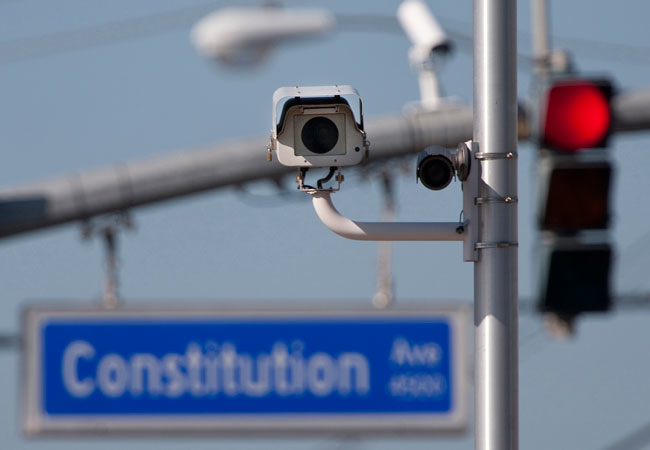Beginning March 19, 2015, the City of Dayton will be required by law to stop using fixed traffic cameras to issue tickets to motorists for speeding and running red lights.
Senate Bill 342 was signed by Governor John Kasich on Dec. 19, 2014, and will go into effect March 19, 2015. According to cityofdayton.org, the new law will require that a police officer be present to witness the infraction if a ticket is to be issued to a motorist.
Dayton has 20 red-light and speeding cameras located across the city, according to cityofdayton.org. Although the traffic cameras will no longer be used to issue tickets, the city said it will still use the cameras to record crashes and traffic data.
That news comes as a relief to Ohio drivers like Wil Downing, an early-childhood education major at Sinclair.
“I think they are just a money-maker,” Downing said about Dayton’s traffic cameras.
Downing owns a Prius and is a self-proclaimed “hyper-miler.” He typically drives five miles per hour under the speed limit to maximize fuel economy.
“I get about 70 miles to the gallon,” Downing said. Even so, he was issued a ticket last winter because of a red-light camera on Alex-Bell Road in West Carrollton.
“The only ticket I’ve ever gotten was for running a red light in an ice storm,” Downing said. “It just turned red, and it would have been more unsafe for me to stop and [risk having] another car hit me from behind.”
The traffic camera caught him in the act, and Downing was issued a $100 ticket for running a red light. Downing told the Clarion he thinks that sometimes Dayton’s red-light cameras make the roads less safe because they might actually encourage people to drive too cautiously, for fear of getting a ticket. This could lead drivers to stop short at yellow lights, he said, catching the drivers behind them off guard and possibly leading to a rear-end collision.
While It has been proven that traffic cameras have a tangible effect on the driving behavior of motorists, the actual numbers of traffic accidents usually goes down, according to Columbus Department of Public Safety Director George Speaks.
“This program has been incredibly successful,” Speaks told The Columbus Dispatch. “Fear of the citation is what has caused the dramatic decline in crashes.”
Broadside crashes at intersections in Columbus decreased by about 73 percent after the cameras went into use, Speaks told The Dispatch, and he said he expects that number to go back up after the new law goes into effect in March.
That expectation appears to be supported by traffic studies like the one that was done in Scottsdale, Arizona in 2007 by the Traffic Safety Coalition. Traffic cameras were placed along the highway for a six-month period and drivers were issued tickets if they exceeded the speed limit by more than 10 miles per hour.
The results were dramatic: an 86 percent decrease in speeding (10 mph or more) and a seven mile-per-hour decrease in average speeds along the photo-enforced stretch of highway used for the study. When the cameras went away at the close of the study, drivers went back to their old, speedy ways.
Drivers like Downing are right about one thing—the cameras are bringing in a lot of money. According to the Columbus Dispatch, the City of Columbus raked in $7.3 million in 2013 with their 44 traffic cameras. That money went toward putting more police cars and more officers on Columbus roadways, and also bought the police department new laptops and other equipment.
Obviously, Downing is not alone in his disdain for the traffic cameras. After all, the public outcry from Ohio drivers was instrumental in creating the legislation that now regulates their use.
Anthony Hannah, an American history major at Sinclair, hasn’t ever been caught speeding by one of Dayton’s traffic cameras, but he told The Clarion he has friends who have.
“Honestly, they feel like some of their rights have been violated,” he said. “If the camera catches you, you automatically have to pay a fine.”
Hannah is technically correct in his assertion that drivers’ rights have been violated. In fact, that is the basis of the argument brought against Dayton and other cities in lawsuits by Cincinnati attorney Mike Allen. According to a report by FOX19, Allen claims that the cameras “violate Ohio’s due process clause.”
“You are supposed to be innocent until proven guilty,” Rep. Ron Maag, R-Lebanon, said to The Columbus Dispatch. “With [traffic] cameras, you are guilty until proven innocent.”
Even though the traffic cameras are unpopular with many drivers and seem to be on their way out (for the time-being), some Dayton drivers appreciate having the cameras around, and they do feel that they make the roads safer for driving.
“I think [it’s] okay the way it is,” one faculty member in Sinclair’s English department said. “I really wish that all the cars would go a little more slowly.”
Those of us who appreciate law and order on Dayton’s roadways will be relieved to know that even though the fixed traffic cameras won’t be used to issue tickets after March 19, the Dayton Police will soon be introducing three Mobile Speed Vehicles that will use cameras to capture images of drivers who commit moving violations. According to cityofdayton.org, one vehicle each will be dedicated to East, West and Central Patrol Operations Divisions. An officer will be present in each vehicle to witness infractions, as per the new law.

